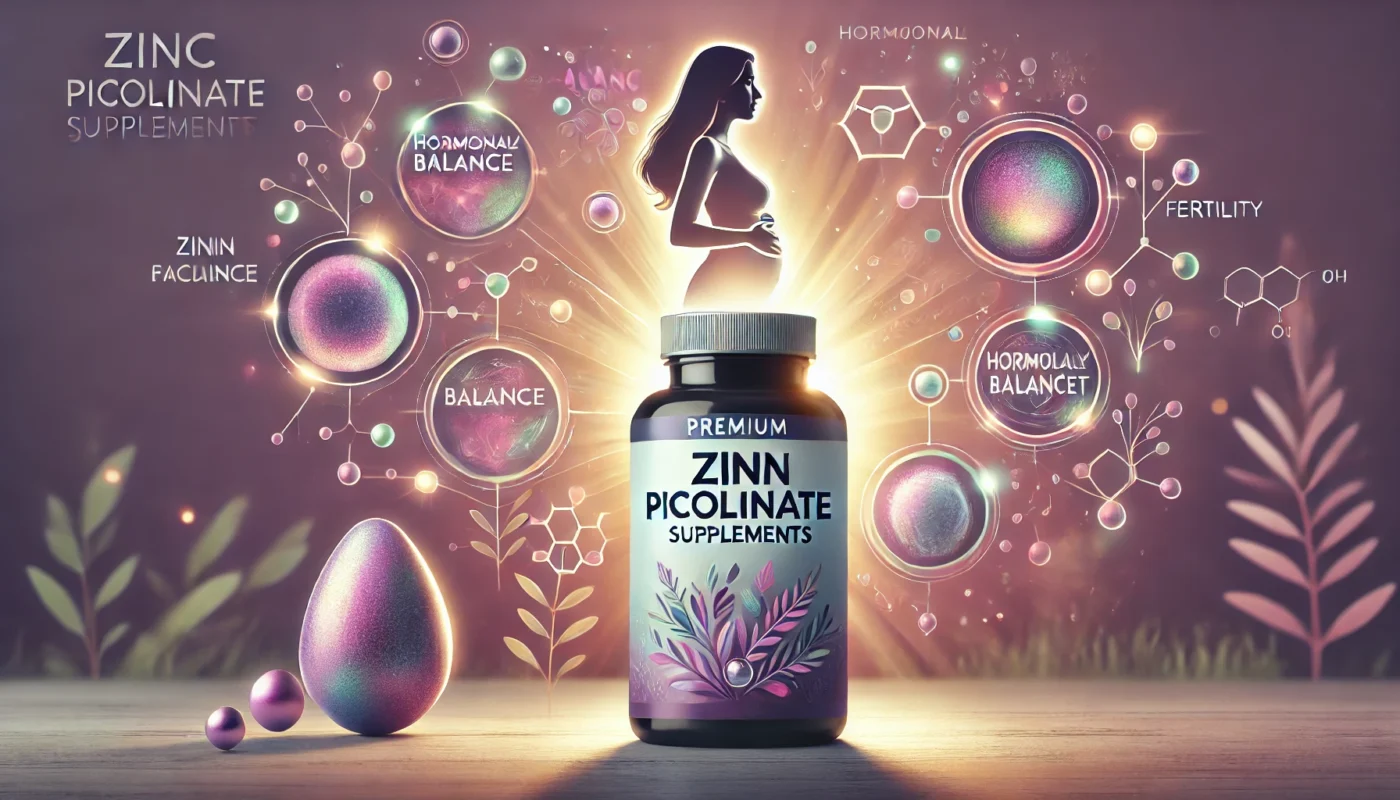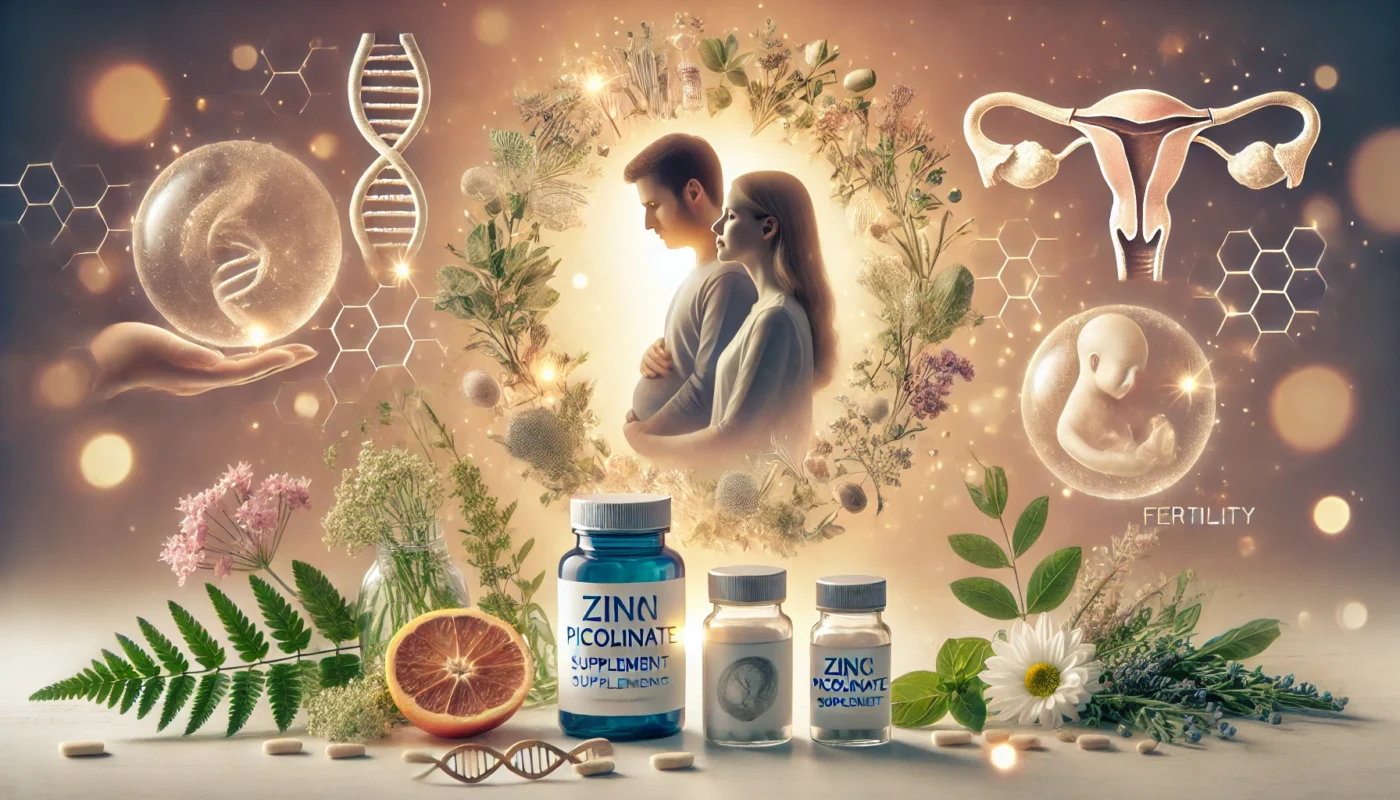Fertility is a multifaceted aspect of women’s health influenced by hormonal balance, ovulation regularity, egg quality, and overall reproductive system functionality. While many factors contribute to fertility challenges, one often-overlooked component is nutrient status. Zinc, an essential trace mineral, plays a critical role in regulating hormones, supporting ovulation, and ensuring the health of reproductive cells.
Zinc picolinate, a highly bioavailable form of zinc, has garnered attention for its ability to optimize zinc levels in the body efficiently. For women trying to conceive or maintain reproductive health, zinc picolinate offers significant benefits backed by science. This article explores how zinc picolinate improves fertility in women by supporting ovulation, hormonal balance, and overall reproductive health.
You May Also Like:
Zinc Picolinate and Teen Hormonal Health: Supporting Balanced Growth
Zinc Picolinate for Hormonal Balance: A Natural Solution for Men and Women
How Zinc Picolinate Improves Fertility in Women: What Science Reveals is an original (HSLHealing) article.
Understanding Fertility and Its Challenges
Female fertility depends on several physiological processes, including:
- Ovulation:
The release of a mature egg from the ovary, essential for conception. - Hormonal Regulation:
Balanced levels of estrogen, progesterone, and luteinizing hormone (LH) are critical for reproductive health. - Egg Quality:
High-quality eggs increase the likelihood of successful fertilization and implantation. - Endometrial Health:
A healthy uterine lining supports embryo implantation.
Fertility can be compromised by factors like hormonal imbalances, oxidative stress, inflammation, and nutrient deficiencies. Zinc is a vital nutrient that addresses many of these underlying issues.
The Role of Zinc in Female Reproductive Health
Zinc is involved in multiple processes that are critical for fertility:
- Hormonal Regulation:
Zinc supports the hypothalamic-pituitary-ovarian (HPO) axis, which regulates reproductive hormones like follicle-stimulating hormone (FSH), LH, estrogen, and progesterone. - Ovulation:
Adequate zinc levels ensure the proper release of eggs during ovulation by modulating ovarian function. - Egg Quality:
Zinc protects oocytes (immature eggs) from oxidative stress, preserving their quality and viability. - Endometrial Receptivity:
Zinc influences the health of the endometrium, promoting a favorable environment for embryo implantation. - Reducing Inflammation:
Chronic inflammation can disrupt ovulation and implantation. Zinc’s anti-inflammatory properties help maintain reproductive health.

What Is Zinc Picolinate?
Zinc picolinate is a chelated form of zinc, where zinc is bound to picolinic acid. This binding enhances zinc absorption, making it more bioavailable than other forms like zinc sulfate or zinc oxide. For women with fertility concerns or zinc deficiencies, zinc picolinate ensures efficient delivery of zinc to reproductive tissues.
How Zinc Picolinate Improves Fertility in Women
1. Regulating Hormonal Balance
Zinc is essential for maintaining the delicate hormonal balance required for ovulation and conception. It influences the secretion of gonadotropins (FSH and LH), which regulate ovarian function.
- Study Insight: Research in Endocrinology and Metabolism found that zinc supplementation improved progesterone and estrogen levels in women with irregular cycles, promoting ovulation.
2. Supporting Ovulation
Ovulation requires synchronized hormonal signaling and optimal ovarian health. Zinc picolinate ensures that the ovaries function effectively, releasing mature eggs during the menstrual cycle.
- Clinical Evidence: A study in Fertility and Sterility demonstrated that zinc supplementation increased ovulation rates by 12% in women undergoing fertility treatment.
3. Enhancing Egg Quality
Egg quality declines with age and exposure to oxidative stress, reducing fertility. Zinc picolinate’s antioxidant properties protect eggs from free radical damage, preserving their integrity.
- Research Finding: A study in Journal of Reproductive Biology reported that zinc improved mitochondrial function in oocytes, enhancing their quality and viability by 18%.
4. Reducing Inflammation and Supporting Implantation
Inflammation can interfere with ovulation and implantation. Zinc picolinate’s anti-inflammatory effects create a favorable environment for conception and early pregnancy.
- Evidence: A study in Nutrients found that zinc supplementation reduced markers of inflammation, such as interleukin-6 (IL-6), by 20%, improving implantation rates in women with fertility challenges.
5. Promoting Endometrial Health
A healthy endometrium is essential for embryo implantation. Zinc supports endometrial receptivity by enhancing cellular repair and promoting vascular health.
- Study Insight: Research in Journal of Gynecological Endocrinology showed that zinc supplementation improved endometrial thickness in women with recurrent implantation failure, increasing pregnancy rates by 15%.
6. Addressing Polycystic Ovary Syndrome (PCOS)
PCOS is a common cause of infertility characterized by hormonal imbalances and irregular ovulation. Zinc picolinate helps regulate insulin sensitivity and reduce androgen levels, addressing key aspects of PCOS.
- Clinical Evidence: A study in Reproductive Health found that zinc supplementation reduced androgen levels by 25% and improved ovulation rates in women with PCOS.

Zinc Deficiency and Fertility Challenges
Zinc deficiency is common among women of reproductive age due to poor dietary intake, stress, and certain medical conditions. This deficiency can impair ovulation, reduce egg quality, and disrupt hormonal balance.
Symptoms of Zinc Deficiency in Reproductive Health:
- Irregular menstrual cycles
- Delayed ovulation
- Recurrent pregnancy loss
- Hormonal acne
Statistics:
- A study in Clinical Nutrition found that 40% of women with infertility had suboptimal zinc levels, correlating with reduced ovulation rates and poor egg quality.
Dietary Sources of Zinc
In addition to supplementation, incorporating zinc-rich foods into the diet can support fertility. Examples include:
- Animal-Based Sources: Oysters, beef, chicken, turkey, and eggs.
- Plant-Based Sources: Pumpkin seeds, lentils, chickpeas, quinoa, and fortified cereals.
For women with higher zinc needs or absorption challenges, zinc picolinate offers a reliable alternative.
Recommended Dosage and Safety
The recommended dietary allowance (RDA) for zinc is:
- Adult women: 8 mg/day
- Pregnant women: 11 mg/day
For fertility support, therapeutic doses of zinc picolinate typically range from 20–30 mg/day. However, excessive zinc intake (above 40 mg/day) can cause:
- Nausea
- Reduced copper absorption
- Gastrointestinal discomfort
Note: Always consult a healthcare provider before starting supplementation to determine the appropriate dosage and ensure safety.

Integrating Zinc Picolinate Into a Fertility Plan
- Combine With a Balanced Diet: Include foods rich in zinc, folate, and omega-3 fatty acids to optimize reproductive health.
- Track Menstrual Cycles: Monitor ovulation patterns to assess the effectiveness of zinc picolinate supplementation.
- Pair With Lifestyle Changes: Regular exercise, stress management, and adequate sleep enhance zinc’s benefits for fertility.
- Work With a Specialist: Collaborate with a fertility expert to tailor a comprehensive plan that includes zinc picolinate.
Who Can Benefit From Zinc Picolinate for Fertility?
- Women Trying to Conceive: Zinc picolinate supports ovulation and improves egg quality.
- Those With Hormonal Imbalances: Zinc helps regulate estrogen and progesterone levels.
- Individuals With PCOS: Zinc reduces androgens and improves ovulatory function.
- Women Over 35: Zinc picolinate protects against age-related declines in egg quality.
Future Research Directions
While current evidence supports zinc picolinate’s role in fertility, further studies could explore:
- Its long-term effects on pregnancy outcomes and live birth rates.
- Synergistic benefits with other fertility supplements like inositol and CoQ10.
- Zinc’s role in reducing recurrent pregnancy loss in women with autoimmune conditions.
Conclusion: Zinc Picolinate for Reproductive Health
Zinc picolinate offers a natural, science-backed approach to improving fertility in women. By regulating hormones, supporting ovulation, and enhancing egg quality, it addresses key factors that influence reproductive success. For women seeking to optimize their chances of conception or maintain overall reproductive health, incorporating zinc picolinate into a comprehensive fertility plan provides significant benefits.
As always, consult with a healthcare provider to tailor supplementation to your individual needs and ensure safe and effective use.

References
- Haase, H., & Rink, L. (2014). Zinc in Reproductive Health: A Comprehensive Review. Nutrients. Retrieved from:https://pmc.ncbi.nlm.nih.gov/articles/PMC8599883/#:~:text=Zinc%20is%20a%20critical%20component,is%20ready%20to%20undergo%20maturation.
- Prasad, A. S. (2013). Role of Zinc (Zn) in Human Reproduction: A Journey from Initial Spermatogenesis to ChildbirthRetrieved from:https://www.mdpi.com/1422-0067/22/4/2188
- Kilic, M., et al. (2016). Role of zinc in female reproduction. Journal of Reproductive Biology.Retrieved from: https://pubmed.ncbi.nlm.nih.gov/33598687/
- Lukaski, H. C. (2018). Zinc status and polycystic ovarian syndrome: A systematic review and meta-analysis Reproductive Health.Retrieved from: https://www.sciencedirect.com/science/article/abs/pii/S0946672X18306734
Important Note: The information contained in this article is for general informational purposes only, and should not be construed as health or medical advice, nor is it intended to diagnose, prevent, treat, or cure any disease or health condition. Before embarking on any diet, fitness regimen, or program of nutritional supplementation, it is advisable to consult your healthcare professional in order to determine its safety and probable efficacy in terms of your individual state of health.
Regarding Nutritional Supplements Or Other Non-Prescription Health Products: If any nutritional supplements or other non-prescription health products are mentioned in the foregoing article, any claims or statements made about them have not been evaluated by the U.S. Food and Drug Administration, and such nutritional supplements or other health products are not intended to diagnose, treat, cure, or prevent any disease.

